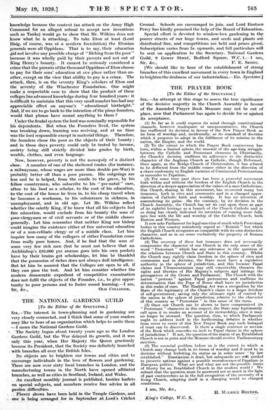THE PRAYER BOOK - .
, [To the Editor of the SPECTATOR.]
-Sia,—An attempt at this stage to assess the true significance of the decisive majority in the Church Assembly in favour of the Amended Prayer Book Measure may not be out of place, now that Parliament has again to decide for or against its acceptance. .
(I) So far as it could express its mind through constitutional channels, however inadequate or unrepresentative, the Church
has reaffirmed its decision in favour of the New Prayer' Book as its form of worship and, incidentally; as its standard of doctrine which it proposes to adopt in the fulfilment of its mission to the nation, the Empire, and the world.
(2) To- the -eitent to which the Prayer Book controversy has
been, within a limited sphere, the renewal of the age-long struggle between the Catholic and Protestant elements in Christianity, the Church's decision reaffirms its adherence to the distinctive character of the Anglican Church as Catholic, though Reformed. Once again, as the Bridge-Church of Christendoin, it has refused to be deflected from the Middle coinze either in the direction of a closer conformity to English varieties of Continental Protestantism or surrender to Papalism.
(3). For some time past there has been a powerful movement both within and without the borders of the English Chuich in the direction of a deeper appreciation'of the values of a sane Catholicism. Our Church, sharing in this movement, has recovered many lost treasures, both in rites and ceremonies and in a changed appre- ciation of Catholic' faith and worship. It has no intention of surrendering its gains. On the contrary, • by its decision in the Church Assembly, the Church has set its seal upon these as part of its rightful heritage as a branch of the Church Catholic and in so doing has clearly indicated its intention of coming more fully into line with the life and worship of the Catholic Church, both Eastern and Western.
It now asks Parliament for legal sanction of much which Protestant bodies in this country mistakenly regard as " Rcimish " but which the English Church recognizes as compatible with its own distinctive character, and as in no sense exclusively the property of Roman Catholicism.
compromise the character of our Church in the only sense of the
(4) The recovery of these lost treasures does not ecessarily necessarily .
word " Protestant " which has any relevance in the question- of the relations between Church and State in this country. Whilst the Church may rightly claim freedom in the sphere of rites and ceremonies and in doctrine, the State must have a regulative authority in the sphere of jurisdiction, and this because Papal claims and Ultramontanism may still conceivably threaten the rights and liberties of His Majesty 's- subjects and infringe, the prerogatives of the Crown and Parliament. The Church with the nation " protests " against Papal pretensions and reaffirms its determination that the Pope of Rome shall have no jurisdiction in this realm of ours. The Enabling Act was a recognition by the State of the legitimacy of the Church's claim to a larger freedom of self-government, saving only the ultimate right of control by the nation in the sphere of jurisdiction relative to the character of this country as Protestant " in this sense of the term. (5) Once our Church can be shown to have compromised its " Protestant " character in this respect, the State may legitimately call upon it to render an account of its stewardship, since it may no longer be steward. The question, then, to which Parliament ought to address itself in the forthcoming debates is whether from cover to cover of this New Prayer Book any such betrayal of trust can be discovered. Is-there a single sentence or section of the Book which concedes an inch to Papal claims in the sphere of jurisdiction ? If not, the question of the status of an Established Church is not in point and the Measure should receive Parliamentary sanction.
(6) The essential problem before us is the extent to which a Church may change both in its forms of worship and if need be in doctrine without forfeiting. its status as in some sense " by law established." Erastianism is dead, but safeguards are still needed to Preserve nations against a possible recrudescence of Papalism iii European politics. What are and what are not the possible limits of liberty for an Established Church in the modern world ? We submit that the question must be answered not so much in the light of past controversies as in the full recognition of the necessity of a living Church, adapting itself in a changing world to changed conditions.
I am, Sir, &c., Al4ustic'n King's C011ege, W.C. 2.


































 Previous page
Previous page